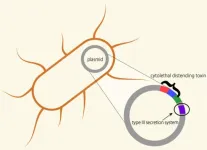(Press-News.org) In an Imperial College London study, humans displayed sympathy towards and protected AI bots who were excluded from playtime.
The researchers say the study, which used a virtual ball game, highlights humans' tendency to treat AI agents as social beings – an inclination that should be considered when designing AI bots.
The study is published in Human Behavior and Emerging Technologies.
Lead author Jianan Zhou, from Imperial’s Dyson School of Design Engineering, said: “This is a unique insight into how humans interact with AI, with exciting implications for their design and our psychology.”
People are increasingly required to interact with AI virtual agents when accessing services, and many also use them as companions for social interaction. However, these findings suggest that developers should avoid designing agents as overly human-like.
Senior author Dr Nejra van Zalk, also from Imperial’s Dyson School of Design Engineering, said: “A small but increasing body of research shows conflicting findings regarding whether humans treat AI virtual agents as social beings. This raises important questions about how people perceive and interact with these agents.
“Our results show that participants tended to treat AI virtual agents as social beings, because they tried to include them into the ball-tossing game if they felt the AI was being excluded. This is common in human-to-human interactions, and our participants showed the same tendency even though they knew they were tossing a ball to a virtual agent. Interestingly this effect was stronger in the older participants.”
People don’t like ostracism – even toward AI
Feeling empathy and taking corrective action against unfairness is something most humans appear hardwired to do. Prior studies not involving AI found that people tended to compensate ostracised targets by tossing the ball to them more frequently, and that people also tended to dislike the perpetrator of exclusionary behaviour while feeling preference and sympathy towards the target.
To carry out the study, the researchers looked at how 244 human participants responded when they observed an AI virtual agent being excluded from play by another human in a game called 'Cyberball', in which players pass a virtual ball to each other on-screen. The participants were aged between 18 and 62.
In some games, the non-participant human threw the ball a fair number of times to the bot, and in others, the non-participant human blatantly excluded the bot by throwing the ball only to the participant.
Participants were observed and subsequently surveyed for their reactions to test whether they favoured throwing the ball to the bot after it was treated unfairly, and why.
They found that most of the time, the participants tried to rectify the unfairness towards the bot by favouring throwing the ball to the bot. Older participants were more likely to perceive unfairness.
Human caution
The researchers say that as AI virtual agents become more popular in collaborative tasks, increased engagement with humans could increase our familiarity and trigger automatic processing. This would mean users would likely intuitively include virtual agents as real team members and engage with them socially.
This, they say, can be an advantage for work collaboration but might be concerning where virtual agents are used as friends to replace human relationships, or as advisors on physical or mental health.
Jianan said: “By avoiding designing overly human-like agents, developers could help people distinguish between virtual and real interaction. They could also tailor their design for specific age ranges, for example, by accounting for how our varying human characteristics affect our perception.”
The researchers point out that Cyberball might not represent how humans interact in real-life scenarios, which typically occur through written or spoken language with chatbots or voice assistants. This might have conflicted with some participants’ user expectations and raised feelings of strangeness, affecting their responses during the experiment.
Therefore, they are now designing similar experiments using face-to-face conversations with agents in varying contexts such as in the lab or more casual settings. This way, they can test how far their findings extend.
END
People sympathize with bullied AI bots
2024-10-17
ELSE PRESS RELEASES FROM THIS DATE:
Providencia rustigianii has virulence gene akin to Salmonella’s
2024-10-17
Salmonella and E. coli are well-known bacteria that cause food poisoning, but less understood are species of Providencia, another causative agent of serious symptoms. Providencia rustigianii, isolated from pediatric gastroenteritis patients, has now undergone whole genome sequencing by a research team led by Osaka Metropolitan University Professor Shinji Yamasaki of the Graduate School of Veterinary Science and the Osaka International Research Center for Infectious Diseases.
Members of the team had previously reported that P. rustigianii carries a cytolethal distending toxin virulence gene on its plasmid. Elimination of this gene did not ...
Ozempic (and similar medications) may be the new treatment for opioid and alcohol use disorder
2024-10-17
A new study published in the scientific journal Addiction has found that people with opioid or alcohol use disorder (OUD, AUD) who take Ozempic or similar medications to treat diabetic/weight-related conditions appear to have a 40% lower rate of opioid overdose and a 50% lower rate of alcohol intoxication than people with OUD and AUD who do not take Ozempic or similar medications.
Ozempic is one of several medications, called glucagon-like peptide-1 receptor agonists or GLP-1 RAs, that are prescribed to treat diabetes, obesity, and other weight-related medical conditions. The medications interact with ...
Artificial nests boost penguin breeding success, but there’s no one-size-fits-all design
2024-10-17
Artificial nests can boost the breeding success of endangered African penguins, but different designs are more effective at different colonies according to a new study by an international team of researchers from South Africa and the UK. The findings are published in the British Ecological Society journal, Ecological Solutions and Evidence.
A new study, led by researchers at Nelson Mandela University, which monitored the breeding success of African penguins for 12 years across South Africa has found that artificial ...
Study: Pediatric healthcare facilities need more staff dedicated to infection prevention
2024-10-17
Arlington, Va. — October 17, 2024 — A new paper published today in the American Journal of Infection Control (AJIC) describes efforts at a major children’s hospital to assess and fulfill its staffing needs for infection prevention and control, highlighting the challenges of allocating sufficient resources to this important role. Infection preventionists (IPs) at Boston Children’s Hospital found that conventional methods for calculating the number of staff for these roles do not accurately reflect the current needs of healthcare systems or the specific needs of a pediatric ...
Marine experts challenge reliability of vessel strike prediction models
2024-10-17
A new study has raised questions about current approaches to predicting the risk of vessel strikes on whales.
Led by researchers at Heriot-Watt University in Edinburgh, Scotland, an international team of scientists compared eight models currently in place to assess and forecast the risk of ships colliding with whales. The study reveals notable inconsistencies in the results across the different models.
Most reports of vessel collisions involve large whales but all species can be affected. Globally, strikes are under-reported and can often go undetected, particularly when they involve large vessels. Collisions can result in animals being injured or killed, and vessels ...
USC study finds link between PFAS, kidney function and gut health
2024-10-17
New research has revealed that the connection between per- and polyfluoroalkyl substances, or PFAS, and kidney damage may be tied to dysregulation of the gut microbiome, which is made up of bacteria and other microorganisms that live in the digestive tract.
PFAS are manufactured chemicals used in a wide range of products, including everything from furniture to food packaging. They are often called “forever chemicals” because once they accumulate in the environment or the human body, they take a very long ...
Compound drought-heatwave events underrecognized in global soils
2024-10-17
Soil is essential for life and plays a crucial role in Earth's ecosystem, providing support for plant roots and hosting countless microorganisms. In a warming world, it is important to understand how soil hydrothermal conditions, particularly dry-hot extremes, have changed already and how they will respond to further warming.
In a study published in PNAS, researchers led by Prof. ZHANG Yunlin from the Nanjing Institute of Geography and Limnology of the Chinese Academy of Sciences, along with collaborators from the Helmholtz Centre for Environmental Research (UFZ) and Bangor University, have quantified global soil compound drought-heatwave (SCDHW) ...
Pursuing the biological mechanisms and diversity of marine life through international collaboration
2024-10-17
The Okinawa Institute of Science and Technology (OIST) and France’s National Centre for Scientific Research (CNRS) have signed an agreement to establish the International Research Laboratory “Eco-Evo-Devo of Coral Reef Fish Life Cycle” (IRL EARLY). The ceremony took place on October 7 at the STS Forum in Kyoto, Japan.
Since life began in our oceans, it has diversified into a wide variety of different organisms. However, the true extent of marine diversity remains unknown, as do many species and their ecologies. Investigating the biological mechanisms of marine life can not only provide a deeper understanding of the life cycles and evolution of these organisms, it ...
Europe’s First ever conference for minoritised life scientists set for Spring 2025
2024-10-17
A unique group of life science professionals and advocates has come together to launch the Minoritised Life Scientists Future Forum, the first major conference in Europe dedicated to supporting and showcasing the contributions of marginalised and underrepresented communities in the life sciences.
Taking place at the ICC Birmingham from 31 March to 2 April 2025, the Future Forum will offer over 200 hours of inspiring talks, workshops, and mentoring sessions. The event is designed for life scientists at all career stages from undergraduate students to early-career ...
mRNA vaccines for disease outbreaks can be synthesized in less time with new technique
2024-10-17
In an era where viral outbreaks can escalate into global pandemics with alarming speed, the ability to quickly develop new vaccines has become crucial. However, the speed of vaccine production is limited because the mRNA used in it is partly chemically synthesized and partly synthesized using enzymes, a relatively slow process.
A team of researchers from Nagoya University in Japan has successfully developed an innovative synthesis technology capable of producing high purity, fully chemically ...




